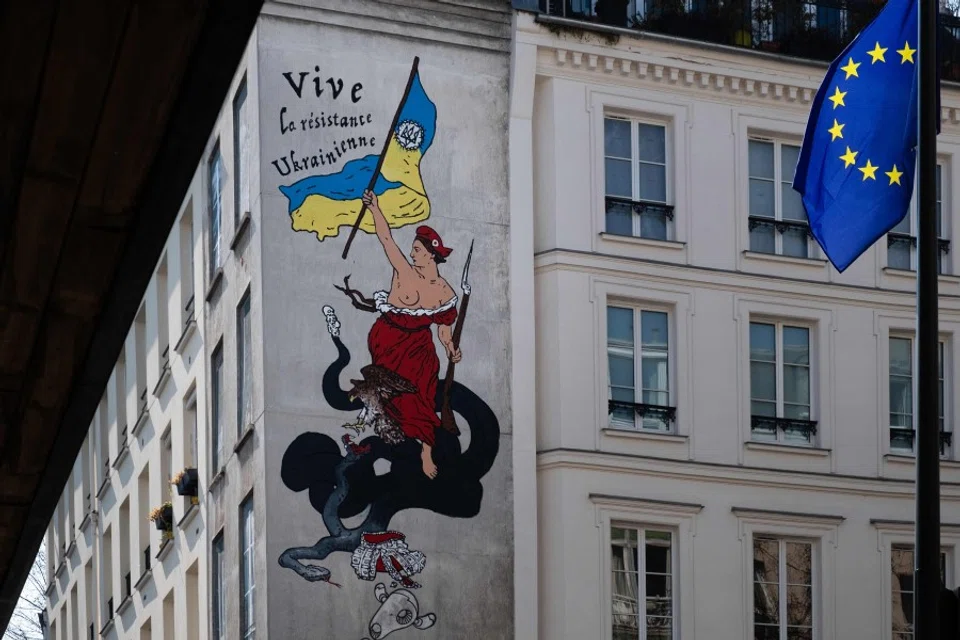How the Ukraine war will reshape the EU's approach to China and Indo-Pacific
The Ukraine war has made the EU, at least for now, more united than before and it is increasingly aligned with the US amid a reinvigoration of NATO. The grouping had erstwhile been seeking to forge a "third way" in playing a role in the Indo-Pacific free of the US-China binary construct. But as it moves closer to the US, will it be carried along by the "democracy versus autocracy" narrative and estrange itself from China to its own detriment?

The Russian attack on Ukraine on 24 February 2022 will go down in history as a watershed moment marking the end of the post-Cold War era of a Western-led international order. The contours of a new global order are just beginning to emerge but have yet to solidify. What this new global system will look like depends on how the West will engage the rest - the many countries in Asia, Africa and elsewhere that do not see the conflict in the binary frame of "democracy against autocracy". Not many countries want to see the world returning to a Cold War era, and the "united" West should hopefully act with humility and be mindful of its actions on other nations and cultures.
In this fast-developing state of affairs, the EU has never been more united. After enduring a decade of crises in the second decade of the 21st century, the EU has often been derided as divided and in decline. However, in the face of the greatest challenge to peace in Europe and to the fundamental principles of the EU, it has stood firm and forged a strong and cohesive stance together with the US to deliver the most unprecedented comprehensive sanctions regime to cripple the Russian economy and Putin's war machine. For the first time, the EU went beyond economic sanctions (its most important coercive instrument in foreign policy because of its economic power), setting aside €500 million for the purchase and delivery of weapons, equipment and supplies to Ukraine, and it recently announced that it would contribute another €500 million under the European Peace Facility.
US-led NATO's new-found vigour and purpose
The war in Ukraine has also reinvigorated NATO and transatlantic ties between Europe and the US. Just a few years ago, with Trump in the White House treating the EU more like an enemy than an ally, the EU was on high gear towards achieving strategic autonomy. Following then German Chancellor Angela Merkel's speech in 2017 when she said that the Europeans must take their fate into their own hands, look after themselves and not rely on others, strategic autonomy has been the buzzword in the EU. Conceived initially as a concept that pushes the EU to build its defence and military capabilities so that the EU can defend Europe without over-reliance on the US, it has in the midst of the Covid-19 pandemic and supply chain disruptions expanded it to mean "how Europe can address vulnerabilities across a wide range of areas - from critical technologies and infrastructure (such as digital networks and cloud computing) to rare earths and the raw materials needed for the green transition", as Josep Borrell, High Representative of the EU for Foreign Affairs and Security Policy, put it.
Furthermore, not only will the EU continue to rely on America for the defence of Europe, but it will also have to rely on the US for its energy security. This is the price that the EU may have to pay for a reinvigorated West led by the US.

Russia's full-scale invasion of Ukraine has seemingly put an end to the EU's quest for strategic autonomy as NATO led by the US has emerged with a new-found purpose. The EU countries may start spending more on defence, but to what end? Instead of being able to make its own decisions on when to use force, the EU will stay in the shadow of the US. Furthermore, not only will the EU continue to rely on America for the defence of Europe, but it will also have to rely on the US for its energy security. This is the price that the EU may have to pay for a reinvigorated West led by the US. Will the EU still be able to exert its own influence on how the West should engage the rest? This we shall have to see in how it engages the Indo-Pacific.
The Council of the EU adopted conclusions on an EU strategy for cooperation in the Indo-Pacific in April 2021, after which a joint communication on the strategy was published in September. One sign of the EU's seriousness in engaging the Indo-Pacific on its own terms was the appointment of an EU special envoy for the Indo-Pacific, while another was the hosting of the first-ever Ministerial Forum for Cooperation in the Indo-Pacific in Paris in February this year. That China and the US were not invited to this ministerial forum was perhaps a signal that the EU is determined to strike a "third way" in its own outreach to the vast Indo-Pacific region.
The EU wants to cement for itself a role in the Indo-Pacific that is less about geopolitical confrontation between the US and China but a comprehensive engagement with other partners to deliver on peace, prosperity, sustainable and inclusive development. This is much welcomed by ASEAN, who shares with the EU an open and inclusive approach towards the Indo-Pacific, and wants the EU to engage ASEAN on its own merits and not let the Sino-US rivalry define their relationship.
While the EU may still have the luxury of engaging ASEAN on its own merits, its relations with China may be much more fraught and circumscribed as the Russian-Ukraine war drags on.

New tenor in EU-China relations
Unfortunately, this ministerial forum held on 23 Feb was overshadowed by the news of Russia's invasion of Ukraine. While the EU may still have the luxury of engaging ASEAN on its own merits, its relations with China may be much more fraught and circumscribed as the Russian-Ukraine war drags on. This is especially if the EU engages in the same rhetoric as Biden framing the war in Ukraine as a fight between autocracy and democracy.
After two decades (1995-2015) of dealing with China primarily as an economic opportunity and focusing on developing comprehensive trade and investment ties, the EU has since 2016 begun to realise that economic relations cannot take place in a political vacuum. The change in tone and the increasing politicisation of the relationship is a result of a number of factors.
First, China's increasing assertiveness and competitiveness has led to an economic partnership that is seen as inherently unequal with huge trade deficits on the side of the EU, and the EU's unhappiness over what is seen as an uneven playing field when it comes to investments in China, and concerns over intellectual property rights.
Second, the launch of China's Belt and Road initiative in 2013 with China "pushing" into the heart of Europe in tandem with the 16+1 framework of cooperation with Central and Eastern European countries was perceived by the EU as a divide-and-rule approach threatening the coherence of an EU that has been weakened by a decade of crises beginning in 2008. Third, the increasing geopolitical competition and rivalry between the US and China.

In its China policy paper published in 2016, there was a significant change in tone in the EU's approach towards China. Capturing the underlying shifts in power balance and the increasing challenges of accommodating China's ambitions, the EU noted in the paper that it expects its relationship with China "to be one of reciprocal benefit in both political and economic terms" and that the EU also expects China "to assume responsibilities in line with the benefits it draws from the rules-based international order". By 2019, the EU openly acknowledged that while China can be a cooperation partner in some areas, it was also an economic competitor in the pursuit of technological leadership and a systemic rival promoting alternative modes of governance.
As the EU and the US now stand "shoulder to shoulder" in confronting the crisis in Ukraine, the EU's relations with China may fall victim to Biden's rhetoric of "democracy versus autocracy".
While the US was under Trump, the EU resisted "joining forces" with the US and "strategic autonomy" was very much on the cards. This strategic autonomy also meant pushing back against the Chinese when needed even as the Chinese became the EU's largest trading partner. The EU went on to conclude a Comprehensive Investment Agreement (CAI) with China at the end of 2020 despite pressure from the US. However, the ratification of the CAI was suspended after retaliatory sanctions imposed by China following sanctions on China by the EU and US over human rights concerns in Xinjiang in 2021.
As the EU and the US now stand "shoulder to shoulder" in confronting the crisis in Ukraine, the EU's relations with China may fall victim to Biden's rhetoric of "democracy versus autocracy". China clearly has interests in maintaining close economic ties with the West for its development-oriented growth model. However, it also sees US global hegemony wrapped in the language of value-based foreign policy as a threat to its development model. The EU did not completely share the US's adversarial approach in the past. As noted in 2019, the EU sees China in a much more nuanced and interest-driven approach, acknowledging China as a partner, a competitor and systemic rival and not simply dismissing it as an autocracy to be shunned. However, the war in Ukraine may be driving Europeans to see its relations with China as a function of the position China takes in the war.

US national security adviser Jake Sullivan speaking before Biden's trip to Brussels for the triple summits on 24-25 March (NATO, EU and G7) said that one of the primary objectives of Biden's trip is to "coordinate our approach vis-à-vis China". In tandem with the US's warning to China not to provide Russia with any support, it is reported that in the upcoming EU-China virtual summit on 1 April, EU leaders will be focused on how to prevent China from undermining the sanctions regime against Russia.
Moving forward, the EU's relationship with China will be increasingly hamstrung by the Russia-Ukraine war. In a worst-case scenario, the EU will fall victim to an all-or-nothing binary approach of shunning China which may lead to an accelerated bifurcation of the global economy. However, if the EU should regain its confidence in seeking strategic autonomy and continue to find ways to work with China when interests align, then there is a fighting chance that the institutionalised framework for economic globalisation can be reformed for the benefit of the West and the rest.
Related: Lessons from Ukraine: Russia might fall into decline by going against global sentiment | On the wrong side of geography: Why is India tolerating Putin's Ukraine gambit? | Will the Ukraine crisis help to improve US-China relations? | When a country needs to choose between realism and idealism



![[Photos] Fact versus fiction: The portrayal of WWII anti-Japanese martyrs in Taiwan](https://cassette.sphdigital.com.sg/image/thinkchina/3494f8bd481870f7c65b881fd21a3fd733f573f23232376e39c532a2c7593cbc)

